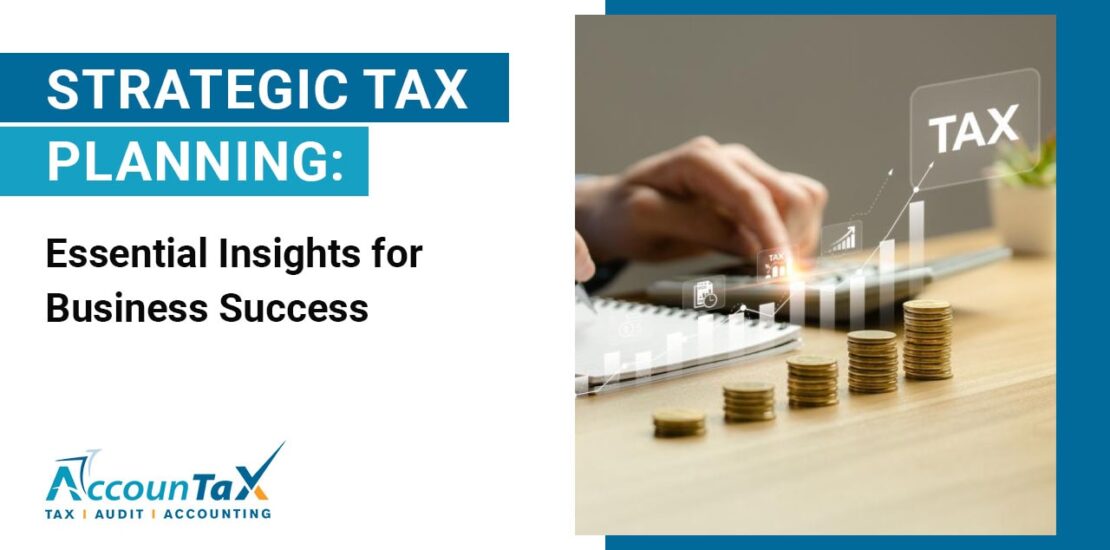Strategic Tax Planning: Essential Insights for Business Success
- March 28, 2025
- Posted by: admin
- Category: Tax

Tax planning is an important area of business management that determines profitability, compliance, and financial health. Customized strategic tax planning UAE ensures the optimization of business tax liabilities while keeping the business compliant. As the tax landscape changes, business tax planning strategies are going to be critical for companies to stay competitive as they adjust to this new environment.
All About Strategic Tax Planning
Tax minimization is the process of leveraging one limitation to aid in the reduction of another. This means businesses must structure themselves, conduct transactions, and make expenditures in alignment with corporate tax strategies that best optimize financial efficiency. Such companies also need to have a good understanding of tax laws, take advantage of deductions, and structure their operations to limit the risk of tax exposure.
The Advantages of Strategic Tax Planning
- Tax Efficiency: Well-planned structures mitigate the tax liability of the business.
- Regulatory Compliance: Maintaining compliance to not face penalties.
- Financial Stability: Improves cash flow management by reducing tax outflows.
- Competitive Advantage: Tax optimization resources for companies
The UAE Business Tax Planning
However, with the onset of corporate taxation, companies need to reassess their business tax planning processes to ensure compliance while also achieving tax efficiency.
Main Aspects of UAE Business Tax Strategy
- Corporate Tax Compliant: Certain businesses need to have UAE corporate tax. It is important to understand tax rates, tax exemptions, and tax reporting requirements to ensure compliance with taxation laws.
- Tax exemption in Free Zones: UAE Free Zones provide tax exemptions, but these exemptions are subject to a specific requirement.
- VAT compliance: Businesses in the UAE are now facing mandatory VAT compliance, which means stricter documentation and reporting protocols are to be adhered to.
- Transnational Corporate Tax: Companies doing overseas trade must navigate double taxation agreements and tax regimes to lower liabilities.
Strategies for Corporate Tax Success
Effective corporate tax strategies aligned with operational goals are essential for sustainable growth. Here are some ways to think about this:
1. Structuring Business Entities
Selecting the appropriate business type can have a substantial effect on tax liability. The types of business structures in the UAE are:
- Mainland Companies: Corporate tax and VAT rules apply.
- Free Zone Entities: Tax Exemptions for Free Zone Entities if Specific Conditions are Met.
- Offshore Company: A company used for international trade with strategic tax benefits.
2. Making the Most of Tax Exemptions and Incentives
The tax structure of the UAE government encourages the growth of the economy. Businesses should explore:
- Industry Exemptions: Some sectors get tax breaks to incentivize investment.
- R&D Tax Credits: Incentives for companies investing in innovation and development.
3. Efficient Expense Management
Expenses also need to be classified strategically to maximize deductions. Key areas include:
- Operating Expenses: Office rents, utilities, and wages can be deducted.
- Depreciation: Asset depreciation schedules assist in lowering their taxable income.
- Interest Payments: If structured correctly, business loans can have interest payments that can be written off.
4. International Tax Planning
If your business is running on an international front, you’ll need international tax strategies. Considerations include:
- Double Taxation Agreements (DTAs): Making the most of UAE’s treaties with other countries to prevent dual taxation.
- Transparency and Fair Pricing (Transfer Pricing Compliance): Making sure fair pricing in intra-group transactions to avoid tax punishment.
How to Ensure Tax Compliance in the UAE?
UAE tax compliance is a cornerstone of successful business operations. Tax laws are complex, and noncompliance can lead to penalties, legal problems, and financial losses. Key compliance areas include:
1. Corporate Tax Filing
Corporations must keep adequate financial records and file taxes by the due dates. Essential aspects include:
- Corporate Tax Registration: Corporates will need to register for corporate tax if they exceed their taxable income threshold.
- Regular Bookkeeping: Keeping records of invoices, financial statements, and audit reports.
- Avoiding Late Payment Penalties: Ensuring tax compliance by paying on time.
2. VAT Compliance
As a reminder of the must-have requirements for businesses since the introduction of VAT in the UAE, businesses are required to:
- VAT registration: Must register with HMRC if turnover exceeds a certain threshold.
- Charging and Collecting VAT: Collecting VAT on taxable products and services.
- File VAT Returns: Submission of VAT reports to the Federal Tax Authority (FTA) Regularly
3. Anti-Avoidance Measures
Tax authorities already have anti-avoidance rules in place to combat the practice. Businesses should:
- Comply with Transfer Pricing Rules: Make sure intercompany transactions are transparent.
- Build the Real Economy: Also to completely kill any reason to have something like this being an artificial tax structure menu.
The Importance of Engaging a Professional Tax Consultant
The key is employing professional tax advisors who bring expert skills in tax planning for success and who are aware of the relevant regulatory changes and developments connected to your compliance requirements. Here are some benefits of hiring tax consultants:
- Tax Planning Precision: Businesses receive detailed, professional advice to ensure they benefit maximally from tax deductions.
- Regulatory Updates: Changes in laws, tax laws amendments, etc are communicated.
- Risk Management: Protect against tax penalties and legal liabilities.
Conclusion
In the UAE, business success is primarily driven by strategic tax planning. Thus, for better financial health and competitiveness, businesses need to remain on track with the above effective corporate tax strategies, pay significant attention to UAE tax law, and seek expert assistance. In general, companies can successfully navigate the complex taxable terrain through good planning and put themselves in an excellent position for long-term growth in the dynamic UAE economy.
